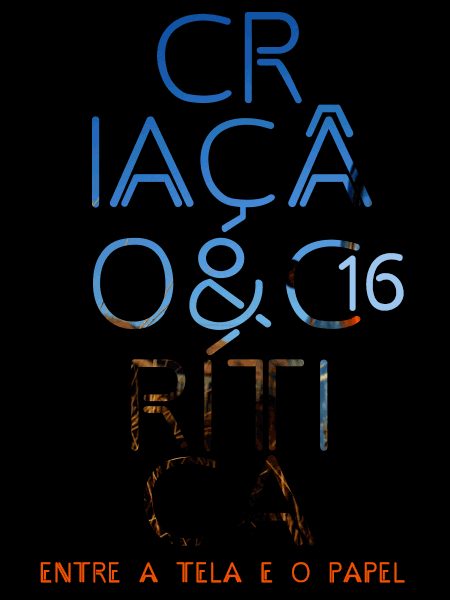Orlando and the cinematic rewriting of gender
DOI:
https://doi.org/10.11606/issn.1984-1124.v0i16p50-60Keywords:
Postmodernism, Feminism, Genre, BodyAbstract
Jorge Luis Borges, the author, said we rewrite literary works rather than simply align ourselves to certain literary forefathers that would shape new texts. Inspired by this statement that denies the mere direct influence, we think of the postmodern film version as another rewriting locus, marked by elements such as irony, performary and exaggerated character in the scenery and costumes of the characters. Such characteristics of film production collaborate to the questioning of gender relations, gender and bodies in Orlando, Sally Potter’s film (1992), which is inspired by Virginia Woolf´s book, Orlando - a biography (1928). This article aims to scrutinize additions to the literary text and elements of postmodernity triggered by Potter’s production, reconfiguring the original narrative and merging a new text. The theoretical discussion will be articulated with bodies of works about postmodernity such as Frederic Jameson (1984), Jean-François Lyotard (1993) and Andreas Huyssen (2010), the genre as a power technology Teresa Lauretis (1994) and as performative construction according to Judith Butler (2010); in addition, there will be reflections on representation and film by Robert Stam and Ella Shohat. We hope to eventually contribute to the analysis of a case of convergence between Feminism and Postmodernism.Downloads
References
Referências bibliográficas:
BUTLER, Judith. Cuerpos que importan: sobre los límites materiales y discursivos del “sexo”. 2ª ed. Trad. Alcira Bixio. Buenos Aires: Paidós, 2008.
BUTLER, Judith. Problemas de gênero: feminismo e subversão do feminismo. Tradução de Renato Aguiar. 3ª edição. Rio de Janeiro: Civilização Brasileira, 2010.
EAGLETON, Terry. Depois da teoria: um olhar sobre os Estudos Culturais e o pós modernismo. Trad. de Maria Lucia Oliveira. Rio de Janeiro: Civilização Brasileira, 2014.
FOUCAULT, Michel. História da sexualidade I: a vontade de saber. 16ª ed. Trad. Maria Thereza da Costa Albuquerque e J. A. Guilhon Albuquerque. São Paulo: Graal Editora, 2005.
HUYSSEN, Andreas. Modernismo después de la posmodernidad. Tradução: Roc Filella. Barcelona: Gedisa, 2010.
JAMESON, Frederic. Posmodernism or the Cultural Logic of Late Capitalism. New Left Review, 146. London, 1984.
LAURETIS, Teresa de. “A tecnologia de gênero”. Trad. Suzana Funck. In: HOLLANDA, Heloísa Buarque de. Tendências e Impasses: o feminismo como crítica da cultura. Rio de Janeiro: Rocco, 1994. p. 206-242.
LYOTARD, Jean-François. The Posmodernism Condition: A Report on Knowledge. Univ. of Minneapolis, 1993.
MACEDO, Ana Gabriela. Narrando o pós-moderno – reescritas, re-visões, adaptações. Universidade do Minho, Centro de Estudos Humanísticos, Coleção Hespérides/ Literatura 20, Braga, 2008.
MACEDO, Ana Gabriela; RAYNER, Francesca (org.). Gênero, cultura visual e performance – Antologia crítica. 2011. Famalicão: Húmus e Centro de Estudos Humanísticos da Universidade do Minho, 2011.
PINTO, Fernando Bruno da Silva Beleza Correia. Passing Between: Problemáticas da Identidade em Orlando de Virginia Woolf e na Adaptação de Sally Potter. Dissertação (mestrado) - Faculdade de Letras da Universidade do Porto. 2009.
SHOHAT, Ella; STAM, Robert. “Estereótipos, realismo e luta por representação”. In: SHOHAT, Ella; STAM, Robert. Crítica da imagem eurocêntrica: multiculturalismo e representação. Trad. Marcos Soares. São Paulo: Cosacnaify, 2006. p. 261-312.
WOOLF, Virgínia. Orlando. Tradução de Ana Luísa Faria. Lisboa: Relógio D’água, 2010.
WOOLF, Virgínia. Um teto todo seu. Tradução de Bia Nunes de Sousa. São Paulo: Tordesilhas, 2014.
Filme:
Orlando. Direção: Sally Potter. Produção: Cert PG, 1992, 93 minutos.
Downloads
Published
Issue
Section
License
Authors who publish with this journal agree to the following terms:
- Authors retain copyright and grant the journal right of first publication with the work simultaneously licensed under a Creative Commons Attribution License that allows others to share the work with an acknowledgment of the work's authorship and initial publication in this journal.
- Authors can enter into separate, additional contractual arrangements for the non-exclusive distribution of the journal's published version of the work (e.g., post it to an institutional repository or publish it in a book), with an acknowledgment of its initial publication in this journal.
- Authors are permitted and encouraged to post their work online (e.g., in institutional repositories or on their website) before and during the submission process, as it can lead to productive exchanges, as well as earlier and greater citation of published work (See The Effect of Open Access).



